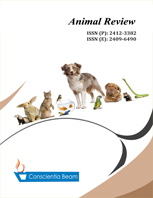Role of Probiotics in Animal Nutrition
DOI:
https://doi.org/10.18488/journal.ar.2017.41.8.20Abstract
The anaerobic probiotic technology (ZAD) is a patented technique. The products are in two forms either liquid or powder. The powder products are coated so it can handle the pressure and the temperature of the extruders. They are fed as follows; 10 gm/head /day for large animals or 1 kg/ tone of fed (for ZADO). In case of Liquid (ZAD); it is fed 10 ml/head/day for large animals and 1.5 ml liter for poultry and rabbits. It decreases the aflatoxins less than 11% by inclusion rate of 7% of ZAD in 7 hours. They are helping the animals to cope with heat stress. Their ability to decrease the cholesterol and triglycerides are noticed by 21 and 19%, respectively. The birds and animal immunity is elevated too. Animal performances are improved in animals fed either form. Milk production increased in dairy cattle (1.5 kg/animal/day) and dairy buffaloes (1kg/head/day). The same trend was recorded for meat production in cattle, buffaloes, and sheep (220, 180 and 90 gm/head/day, respectively as an average daily gain). For poultry, it helped in decreasing the fattening period by 5 days. In fish, the final weight increased by 18%. For rabbits, it increased the milk production, decreased the mortality rate, increased the average daily gain, and improved all over physiological aspects of rabbits.

